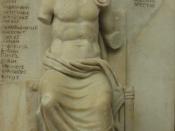Nina Chabria. N10134823
Portrayal of Helen in HELEN by EURIPIDES. Translated by James Morwood.
Helen, the daughter of Zeus and Leda, epitomized the perfection of beauty, a verdict that has found unanimous approval through the ages. However, debate continues to rage on whether she was a victim of her indubitable good looks and an unwitting pawn in a conflict between the Gods and Goddesses or did her allure mask an inherent deceit that created devastation in its wake. In Euripides' Helen, translated by James Morwood, the mortal Helen is shown as a contrast to her nemesis, a phantom replica of herself, created by a spiteful Hera and on who lay the ignominy of being the cause of the Trojan War.
Euripides portrays Helen as a selfless, persecuted but nevertheless guilt-stricken character whose life has been turned upside down. She claims she never stepped foot into Troy and her name has been sullied by circumstances created by divine scheming, "I am a victim of many catastrophes.
First of all, though I have done nothing wrong, all speak ill of me. And this is a greater blow than the truth itself-when one has endured blows that do not belong to me. The Gods have removed me from my fatherland and exposed me to a barbarian civilization." She was transported by Zeus for the duration of the Trojan War to Egypt and was left under the protection of the virtuous King Proteus. The reputation of notoriety that engulfs her was earned by her image, that accompanied Troy to Paris, as she claims her own innocence, "I am the long-suffering one, and yet men curse me, for, as it seem, I have betrayed my husband and started a great war for the Greeks." [1: Euripides, and James Morwood. Medea...


